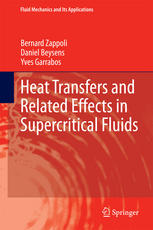

Most ebook files are in PDF format, so you can easily read them using various software such as Foxit Reader or directly on the Google Chrome browser.
Some ebook files are released by publishers in other formats such as .awz, .mobi, .epub, .fb2, etc. You may need to install specific software to read these formats on mobile/PC, such as Calibre.
Please read the tutorial at this link: https://ebookbell.com/faq
We offer FREE conversion to the popular formats you request; however, this may take some time. Therefore, right after payment, please email us, and we will try to provide the service as quickly as possible.
For some exceptional file formats or broken links (if any), please refrain from opening any disputes. Instead, email us first, and we will try to assist within a maximum of 6 hours.
EbookBell Team

4.1
90 reviewsThis book investigates the unique hydrodynamics and heat transfer problems that are encountered in the vicinity of the critical point of fluids. Emphasis is given on weightlessness conditions, gravity effects and thermovibrational phenomena. Near their critical point, fluids indeed obey universal behavior and become very compressible and expandable. Their comportment, when gravity effects are suppressed, becomes quite unusual.
The problems that are treated in this book are of interest to students and researchers interested in the original behavior of near-critical fluids as well as to engineers that have to manage supercritical fluids. A special chapter is dedicated to the present knowledge of critical point phenomena. Specific data for many fluids are provided, ranging from cryogenics (hydrogen) to high temperature (water). Basic information in statistical mechanics, mathematics and measurement techniques is also included. The basic concepts of fluid mechanics are given for the non-specialists to be able to read the parts he is interested in. Asymptotic theory of heat transfer by thermoacoustic processes is provided with enough details for PhD students or researchers and engineers to begin in the field. Key spaces are described in details, with many comparisons between theory and experiments to illustrate the topics.